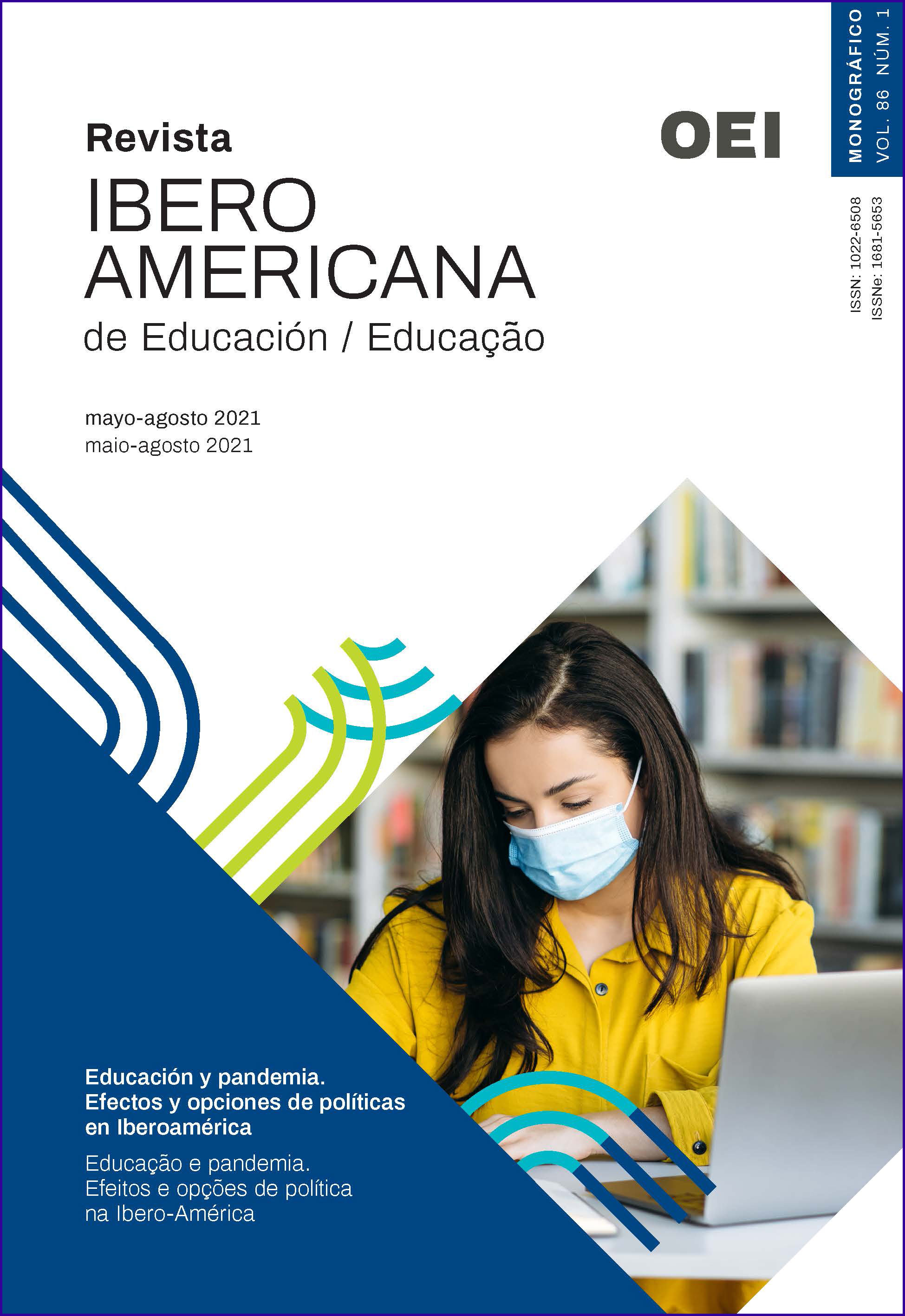Educational opportunities and the COVID-19 pandemic in Latin America
DOI:
https://doi.org/10.35362/rie8614557Keywords:
education and COVID-19; pandemic and education; remote teaching; learning opportunities; educational policiesAbstract
This article examines the educational impact of COVID-19 in Latin America, situating this study in the context of the education policies advanced during the last decades, and their effects on the increase in educational opportunities.
The article argues that the pandemic initiates the fifth wave of transformation of the educational systems of Latin America, increasing the educational opportunity gaps between students of different social class and nationality, and thus also increasing the need for greater relevance of the educational systems in addressing the social, political and economic challenges in the region, which the pandemic has, in turn, complicated.
The article examines, based on the review of studies on the subject, the educational impact of the pandemic via its health and economic effects, which result in an increase in poverty conditions, as well as via the in-person suspension of classes and the creation of modalities of remote learning, of variable effectiveness and in particular of limited effectiveness in maintaining the learning opportunities of lower-income students.
Downloads
References
Álvarez, H. y otros (2020). La educación en tiempos del coronavirus: los sistemas educativos de América Latina y el Caribe ante COVID-19, Documento para Discusión, N° IDB-DP-00768, Washington, D.C., Banco Interamericano de Desarrollo (BID). Recuperado de https://bit.ly/3z4yVS9.
Banco Mundial (2020a). COVID-19 to Add as Many as 150 Million Extreme Poor by 2021. Recuperado de https://bit.ly/3clyN71
Banco Mundial (2020b). Simulating the Potential Impacts of the COVID-19 School Closures on Schooling and Learning Outcomes: A set of Global Estimates. IBRD-IDA. Recuperado de https://bit.ly/3cpZyHu
Banco Mundial (2020c). Individuals using the Internet (% of population) - Bangladesh). Recuperado de https://bit.ly/2RAoMM4
Banco Mundial (2020d). Education Systems’ Response to COVID-19: Brief. Recuperado de https://bit.ly/3w22JNm
Bottan N, Hoffmann B y Vera-Cossio D (2020). The unequal impact of the coronavirus pandemic: Evidence from seventeen developing countries. PLoS ONE 15(10): e0239797. https://doi.org/10.1371/journal.pone.0239797 DOI: https://doi.org/10.1371/journal.pone.0239797
Dellagnelo, L. y Reimers, F. (2020). Brazil: Secretaria Estadual de Educação de São Paulo (São Paulo State Department of Education). Education continuity stories from the coronavirus crisis. OECD Education and Skills Today. Recuperado de https://bit.ly/3gfULJG
Donnelly, R. y H. Patrinos (2021). Learning loss during COVID-19: An early systematic review. Covid Economics 77, 145-153. DOI: https://doi.org/10.21203/rs.3.rs-518655/v1
Ferreyra, M. M., Avitabile, C., Botero, J., Haimovich, F. y Urzúa, S. (2017). At a Crossroads Higher Education in Latin America and the Caribbean. Washington, DC: World Bank. Recuperado de https://bit.ly/3ggdKnA DOI: https://doi.org/10.1596/978-1-4648-1014-5
Giannini, S. (2020). Distance Learning Denied. Over 500 million of the world’s children and youth not accessing distance learning alternatives. Recuperado de https://bit.ly/3ioXNhq.
González, C.J. (2020, September 8). Mensaje del gobernador Carlos Joaquín a la ciudadanía, en ocasión del 4º Informe de Gobierno, desde el C5 en Cancún. Gobierno Quintana Roo, Mexico. Recuperado de https://bit.ly/3iobeOL
Hallgarten, J. (2020). Evidence on Efforts to Mitigate the Negative Educational Impact of Past Disease Outbreaks. Institute of Development Studies. Reading, UK: Education Development Trust, (Report 793).
Hanushek, E. A. y Woessmann, L. (2020). The Economic Impact of Learning Losses. Education Working Papers, No. 225. OECD Publishing. Paris. Recuperado de https://bit.ly/3cnUxiI
Hinckley, K., Jaramillo, M., Martinez, D., Sanchez, W y Vazquez, P. (2021). in Reimers, F., U. Amaechi, A. Banerji and M. Wang (Eds.) 2021. An educational calamity. Learning and teaching during the COVID-19 pandemic (pp. 191-235). Independently published.
Johns Hopkins University (2021). Coronavirus Resources Center. Recuperado de https://bit.ly/3vcfzaq
Maldonado, J.E. y de Witte, K. (2020). The effect of school closures on tandardized student test outcomes. KU Leuven. Department of Economics. Discussion paper series DPS20.17. Recuperado de https://bit.ly/3gkLIY7
MEJOREDU (2020a). Experiencias de las comunidades educativas durante la contingencia sanitaria por COVID-19 . Educación básica. Informe Ejecutivo. Comisión Nacional para la Mejora Continua de la Educación. Recuperado de https://bit.ly/3fZNaQE.
OECD (2015). E-Learning in Higher Education in Latin America, París: Development Center Studies, OECD Publishing. https://doi.org/10.1787/9789264209992-en DOI: https://doi.org/10.1787/9789264209992-en
OECD (2019). PISA 2018 Results. Volume 1 What Students Know and Can. París
Reimers, F. (Ed.) (2020a). Audacious Education Purposes. Cham: Switzerland. Springer. Recuperado de https://bit.ly/3zeCPb5
Reimers, F. (2021a). Education in H. F. Carey (ed.), Understanding Contemporary Latin America (Boulder, CO: Lynne Rienner Publishers, 2021), Fifth Edition.
Reimers, F. (Ed.) (2021b). Primary and Secondary Education During COVID-19. Cham, Switzerland: Springer. DOI: https://doi.org/10.1007/978-3-030-81500-4
Reimers, F., DeShano, C. y Trevino, E. (2006). Where is the ‘Education’ in the Conditional Transfers for Education. Montreal: Unesco Institute for Statistics. Recuperado de https://bit.ly/3g4Opht
Reimers, F. y Schleicher, A. (2020). Schooling Disrupted. Schooling Rethought. How the COVID-19 pandemic is changing education. Paris: OECD. Recuperado de https://bit.ly/3zfarWk
Reimers, F., Amaechi, U., Banerji, A. y M. Wang (Eds.) (2021). An educational calamity. Learning and teaching during the COVID-19 pandemic. Independently published. Recuperado de https://bit.ly/3ioA8O2
Ripani, F. y Zucchetti, A. (2020). México: Aprende en Casa (Learning at home), Education continuity stories series. OECD. World Bank Group. HundrED. Global Education Innovation Initiative. Recuperado de https://bit.ly/3w4LhI3
São Paulo (2020). Merenda em Casa. São Paulo Governo do Estado. Brazil. Recuoerado de https://bit.ly/3uXqox7
SEP (2020). Boletín No. 101. Quintana Roo. Secretaría de Educación Pública, México. Recuperado de https://bit.ly/3w4RZxw
SEQ (2020). Guías De Experiencias Quintana Roo / Ciclo Escolar 2020-2021. Edited by Secretaría de Educación de Quintana Roo SEQ. Gobierno Del Estado Quintana Roo
Unesco (2021a). Global Education Monitoring Report 2020. Latin America and the Caribbean. Inclusion and Education: All Means All. París: Unesco.
Unesco (2021b). Unesco figures show two thirds of an academic year lost on average worldwide due to COVID-19 school closures. Recuperado de https://bit.ly/2TRcqzW.
Unesco, Unicef y Banco Mundial (2020). What have we learnt? Overview of findings from a survey of ministries of education on national responses to COVID-19. Recuperado de https://bit.ly/2SaUTSY.
United Nations (1992). Education and knowledge: basic pillars of changing production patterns with social equity. Economic Commission for Latin America. Santiago: Libros de la CEPAL. DOI: https://doi.org/10.18356/212d7eec-en
How to Cite
Published
Issue
Section
License
Any authors who publish with this journal accept the following terms:
















